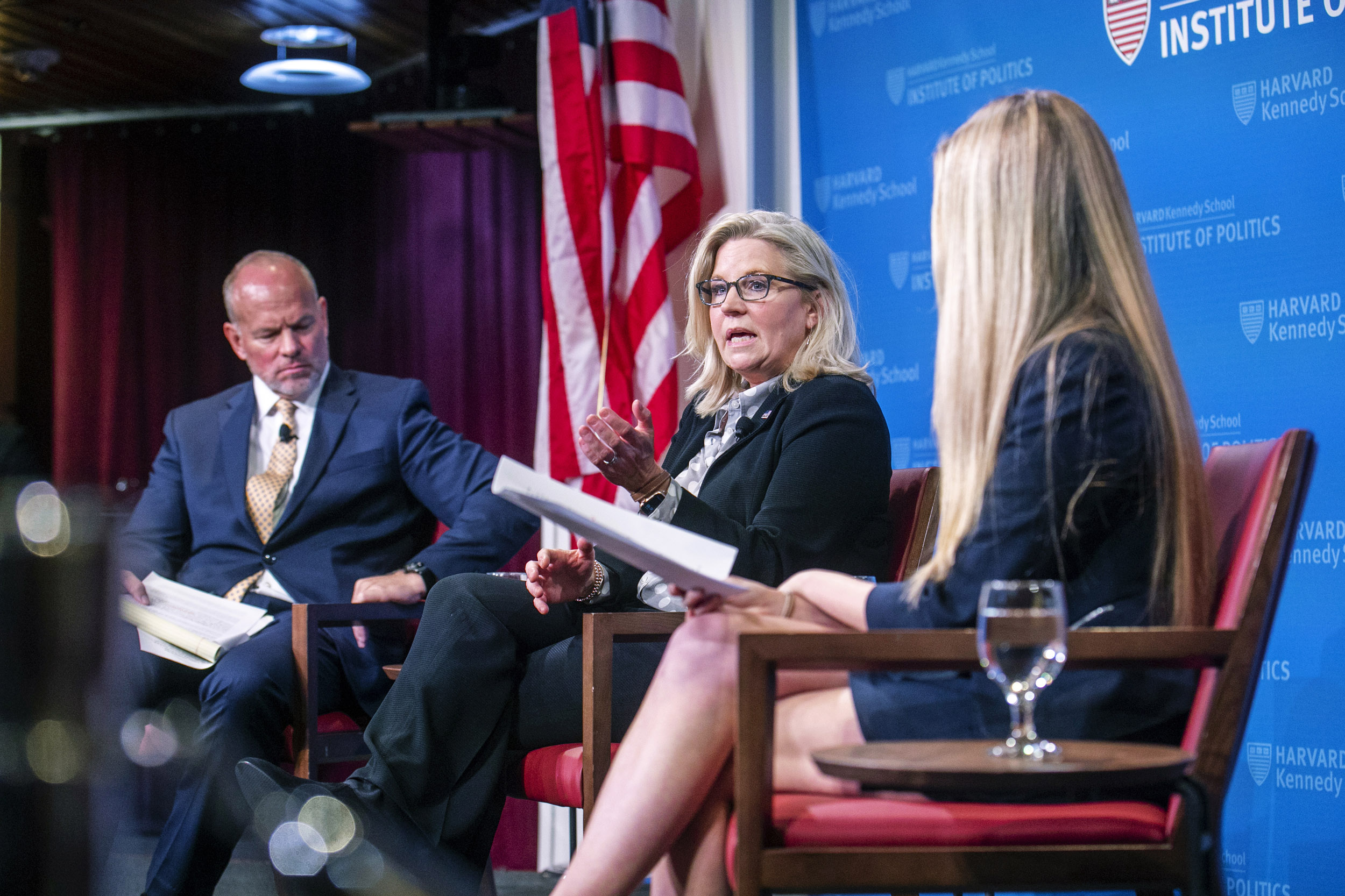
U.S. Rep. Liz Cheney (center) spoke with former Wyoming Gov. Matthew Mead and Hannah A. Bottarel ’24 about her work as vice chair of the Jan. 6 Committee.
Jon Chase/Harvard Staff Photographer
‘Right this ship of democracy’
Liz Cheney talks about Jan. 6 committee, state of GOP, need for young Americans to step up
One person can make a difference in our democracy.
U.S. Rep. Liz Cheney says that was a lesson she took away from the accounts of hundreds of witnesses who bravely came forward to testify to the Select Committee to Investigate the Jan. 6 Attack on the U.S. Capitol about what they did to try to stop a multipronged effort to overturn the 2020 election.
Political observers might argue that the Wyoming Republican wouldn’t necessarily be a bad example herself.
Cheney spoke with former Wyoming Gov. Matthew Mead, a fellow Republican, and Hannah A. Bottarel ’24 about her work as vice chair of the Jan. 6 Committee, the current state of the GOP, and what democracy requires from Americans at this critical juncture during an Institute of Politics forum at Harvard Kennedy School on Tuesday evening.
Cheney, as conference chair, was the third most powerful Republican in the House but was removed from that role in 2021 after refusing to go along with the party’s support for former President Donald Trump and his false claims that the 2020 election was stolen. She lost her bid for re-election this year to Harriet Hageman, a Trump-endorsed candidate, and Cheney is a pariah in much of the Republican Party. But she’s earned praise from Democrats and Independents and has become renowned both here and abroad for her political courage in standing up to her party and willingness to serve on the Jan. 6 committee.
“I’m very proud of the work that we’ve done and of my fellow members of that committee,” she said. “I think it’s probably the most important thing I’ve ever done professionally, and absolutely crucial to the functioning of our democracy going forward.”
Last week, the Jan. 6 committee voted unanimously to seek a House vote to subpoena Trump as part of their ongoing investigation. Cheney was confident a subpoena for Trump’s testimony under oath, along with unspecified documents, would be issued “shortly.” Should Trump not honor the subpoena, as many political and legal observers expect, Cheney said the panel will “take the steps we need to take.”
In explaining the decision, Cheney said the committee felt it was their obligation to seek Trump’s testimony and “that the American people deserve to hear directly from him, that it has to be under oath, [and] that he has to be held accountable.”
Cheney brushed back questions about the committee’s effectiveness or what it has accomplished as polls show little change in public opinion about the Capitol attack since it began its work.
When people look back at this moment in history, she said, one of the most important lessons from this period will be “that individuals made the difference.” Whether federal or state officials, political appointees working in the federal government, campaign staffers, government employees or police officers, there were many “people who said, ‘No. We’re not going to allow you to steal the election.’”
“Our institutions don’t defend themselves,” Cheney said. “Jan. 6 could’ve been far worse if people in positions of authority hadn’t stood up.”
A lifelong Republican, Cheney expressed concerns about the direction of her party but also about that of the Democrats. She said she does “worry very much” about “what’s happening on the left,” calling some of their economic policies “misguided and dangerous.”
“But no matter how concerned people are about bad policy on the left, the solution for conservatives cannot be that we’re going to torch the Constitution.”
The only way the GOP can move beyond its current state is to elect good candidates and to “incentiviz[e] the serious people” who may want to serve, not the extreme voices who gain power with every daily outrage.
Cheney pointed to a group of Democratic women she has “the utmost respect for” who serve with her on the Armed Services Committee as an example of public servants who take the job seriously.
Reps. Abigail Spanberger and Elaine Luria of Virginia, Elissa Slotkin of Michigan, and Chrissy Houlahan of Pennsylvania are “women whom I may have big disagreements with on some issues, but man, they are there for the right reason. They work hard, and I know that they want what’s best for the country,” Cheney said. “And I know that we can have a discussion and a disagreement and figure out where we agree. Those are the kinds of people that you can trust with the future of this country.”
Responding to Republican Minority Leader Kevin McCarthy’s warning earlier in the day that U.S. financial support for Ukraine may be cut if the GOP wins back the House majority in November, Cheney called the remarks “really disgraceful.”
“American leadership is really important, but you also have to make sure that democracies are better armed than tyranny,” she said. “Today, Ukraine is the frontline in the battle for freedom. And the world, not just America, but the world, has an obligation to make sure that Ukraine prevails.”
Watching what’s going on in government can understandably leave students overwhelmed and feeling as if there’s little they can do to influence what happens, Cheney said. “But the reality is, you are the only ones who can influence it. The only ones.”
Whether running for office or voting for candidates who believe in the Constitution and the rule of law, she said, “None of us can be a bystander. We need every one of you. We need you involved and engaged. There’s no more important thing you could be doing than helping to make sure that we right this ship of our democracy.”




